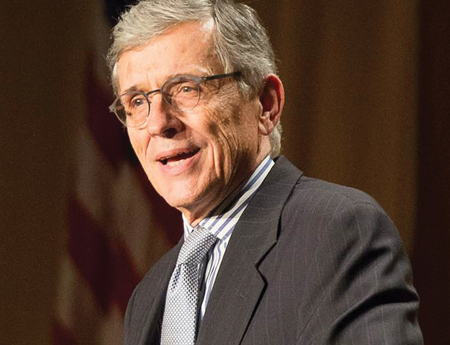States Pushing Back Hard With D.C. on Preemption Of Broadband Regs

The smarter way to stay on top of broadcasting and cable industry. Sign up below
You are now subscribed
Your newsletter sign-up was successful
Cable operators are gathering strong support in their battle against federal preemption of state laws circumscribing municipal broadband build-outs.
Groups representing state legislatures—including some state legislators themselves—joined with groups made up of state regulatory commissioners and governors Jan. 26 to speak with reporters about the threat of FCC preemption of laws that put various requirements or limits on city-funded networks.
That threat of preemption has come from both the FCC and the White House, which at times appear to be coordinated in their broadband initiatives.
FCC chairman Tom Wheeler has said that loosening “legal restrictions on the ability of cities and towns to offer broadband services to consumers in their communities” could boost competition, competition, competition—his mantra. President Obama, in a strongly worded speech this month, said essentially the same thing.
Wheeler plans for the FCC to vote Feb. 26 on petitions from two municipalities—Chattanooga, Tenn., and Wilson, N.C.—seeking federal preemption of state laws. He is widely believed to have the votes to grant those petitions. An FCC spokesperson confirmed the Feb. 26 vote is on.
Wheeler and the president have said they see the state laws primarily as efforts by incumbent ISPs to prevent price and service competition. The associations, which got together last week to express their collective will to push back against preemption, spoke about the need to protect the sovereignty of state laws over their municipalities.
Neal Osten, executive director of the National Council of State Legislators’ D.C. office, said last week that NCSL has told Wheeler it was unhappy with his comments to the National Cable & Telecommunications Association and elsewhere that preemption might be necessary. Osten also said the Supreme Court has signaled that there is a presumption against preemption.
The smarter way to stay on top of broadcasting and cable industry. Sign up below
Elected state policymakers and state officials are speaking with one voice against preemption. NCLS joined with the NGA and the Council of State Governments to tell the FCC in no uncertain terms that they would oppose preemption.
Osten suggested that the president, as a former state senator, should understand that “states are ultimately responsible for the fiscal well-being of their subdivisions.”
Legislators on the call said the laws were meant to provide consistency of oversight and to insure taxpayers weren’t on the hook for muni broadband systems that failed, to the tune of many millions of dollars.
South Carolina’s state broadband law says that government networks can’t receive a benefit not provided to nongovernment networks. State Sen. Thomas Alexander said he thought that should be a road map for success rather than being undone through preemption.
Minnesota state Rep. Joe Atkins said he had a question for Wheeler if he goes down the preemption path: “Is the FCC going to foot the bill when there are failures?” Atkins said one Minnesota city, Montecello, is being sued by its bondholders because its broadband effort “has gone belly up in a huge way.”
The groups signaled that if the FCC goes ahead with preemption, it can expect a tough court fight. They seemed confident that court precedent was in their favor.
COMCAST/TWC MERGER UPDATECOMCAST AND
Time Warner Cable have agreed to extend the end date of their merger agreement by six months, to Aug. 12. The companies initially told the SEC the deal would be completed by Feb. 12, a year after its announcement. But they anticipated an extension might be necessary given that neither controls the vetting process by the FCC and Justice Department, and a court challenge to the FCC’s protective order had made it essentially a formality unless the parties decided not to do the deal.
According to an attorney involved, a ruling on a challenge to the FCC regarding the deal by programmers including CBS, Time Warner, Fox, Viacom and Univision is not expected until at least April.
Financial analysts are still predicting approval, likely with conditions related to high-speed broadband and nondiscriminatory access to programming, though the odds have lowered a bit. “We’re at 70%, down from 80% previously,” said analyst Craig Moffett of MoffettNathanson.
Contributing editor John Eggerton has been an editor and/or writer on media regulation, legislation and policy for over four decades, including covering the FCC, FTC, Congress, the major media trade associations, and the federal courts. In addition to Multichannel News and Broadcasting + Cable, his work has appeared in Radio World, TV Technology, TV Fax, This Week in Consumer Electronics, Variety and the Encyclopedia Britannica.

